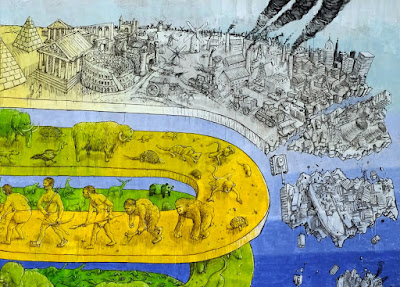I came up with a few ideas.
Im trying to think about all of the subjects that encompass my topic, and then I'm trying to think about all of the things I want to know more about.
So at the moment my topic is centred around deforestation, but I want to research into palm oil production, sustainable materials, whether designers/creatives take a sustainable approach to their work.
I want to look into the age of humans and what we are potentially doing to our own beautiful planet.
I saw something the other day thats really inspired me...
A mural created by 'Blu' on the streets of Italy. A dire evolutionary timeline.
Definitely makes you think.

Now i need to-
Start making some drawings.
Do lots of research.
Im excited to get started, I'm actually excited to learn about all of this.


















